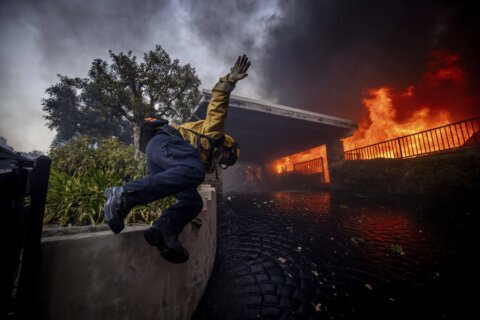ATLANTA (AP) — Several Democrats serving as their state’s top election officials have sent a letter to the parent company of Facebook, asking it to stop allowing ads that claim the 2020 presidential election was stolen.
In the letter addressed to Meta CEO Mark Zuckerberg, the secretaries of state from Colorado, Maine, New Jersey, Oregon, Rhode Island, Washington and Vermont said allowing such ads will further erode trust in elections and fuel threats of political violence against election workers, which already has led some to leave the profession. Also signing the letter was Wisconsin Secretary of State Sarah Godlewski, who does not oversee elections.
“Meta is allowing extremists and election deniers to further undermine our elections,” the secretaries wrote in the letter, which was emailed to the tech giant on Thursday. “As Secretaries of State, we are strongly opposed to Meta’s decision to allow ads promoting election denialism and urge you to repeal this policy before it inflicts more damage.”
Nearly four years later, conspiracy theories surrounding the 2020 election and false claims of widespread fraud and manipulation of voting machines persist. Former President Donald Trump continues to insist, despite no evidence of widespread fraud, that he won that election as he seeks a return to the White House.
Reviews, recounts and audits in the swing states where he disputed his loss have all affirmed Democrat Joe Biden’s victory, and even Trump’s former attorney general said there was no fraud on a scale that could have tipped the election. In an interview this week with the Milwaukee Journal Sentinel, Trump falsely claimed he won Wisconsin despite losing to Biden by about 21,000 votes. Trump told the news outlet he would accept the results of the November election “if everything’s honest.”
Since the 2020 election, election workers across parts of the country have faced death threats and harassment. A recent survey by the Brennan Center for Justice at NYU found that 34% of local election officials said they knew of one or more local election officials or election workers who left their job at least in part because of safety fears, threats or intimidation. The environment has led to a historic turnover of election workers throughout the country.
YouTube, the Google-owned video service, announced a policy similar to Meta’s last year in which it said it would stop removing content that falsely claimed previous U.S. presidential elections were tainted by fraud.
Meta has defended the work it’s doing to protect elections globally. A company spokesperson provided details about how the company views elections, referencing its 2022 plan for the midterm elections in which the company said it will “continually review content to determine if it violates our community standards, including our policies on election and voter interference, hate speech, coordinating harm and publicizing crime, and bullying and harassment.”
As part of its work, Meta said it would remove election-related content that includes misinformation about the “dates, locations, times and methods of voting” along with calls for violence related to voting or the outcome of an election. In that plan, the company specified it would reject ads calling into question the legitimacy of an upcoming or ongoing election.
But it’s the ads related to the 2020 election that have the group of Democratic secretaries of state concerned, including various campaign ads earlier this year repeating false claims that the election was rigged. The letter was organized by the Democratic Association of Secretaries of State, a political action committee affiliated with the Democratic National Committee, and was circulated only among Democrats.
“When people believe an election was stolen they are less likely to have confidence in the system, and that depresses turnout,” Maine Secretary of State Shenna Bellows said in an interview Friday. “We want voters to know the truth about elections and feel empowered to participate.”
Copyright © 2025 The Associated Press. All rights reserved. This material may not be published, broadcast, written or redistributed.







